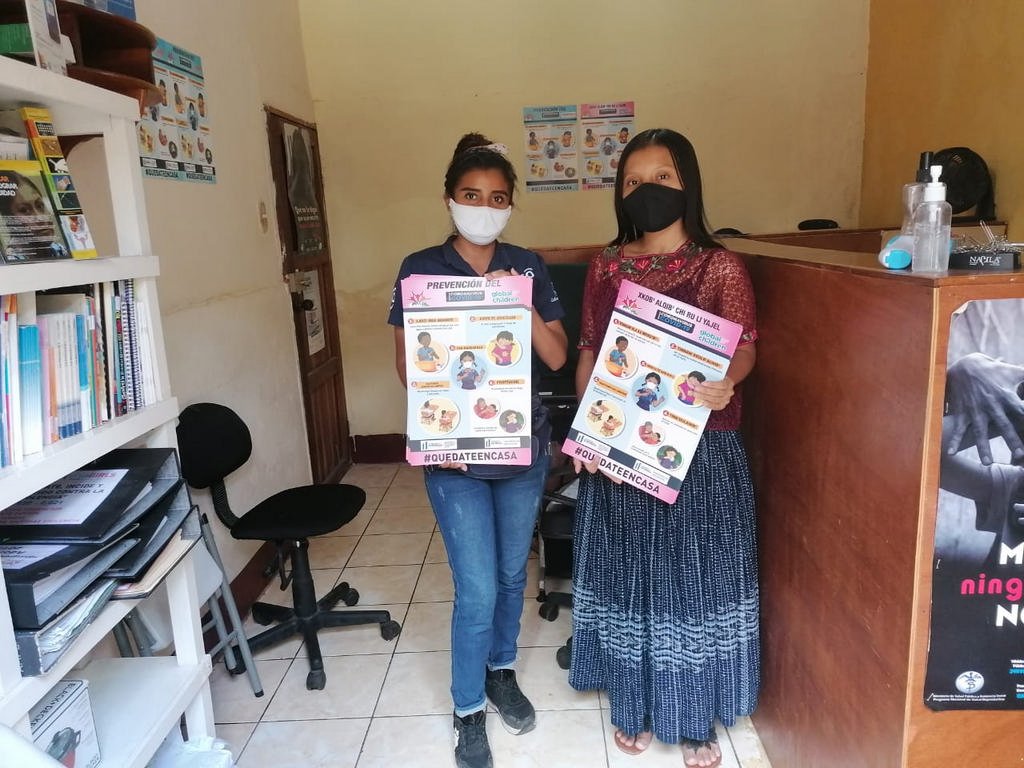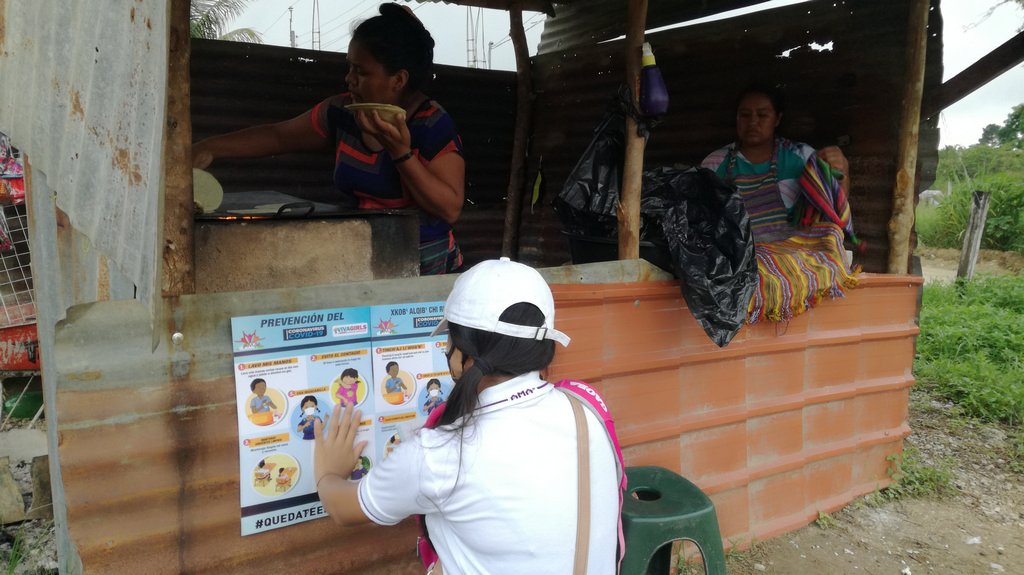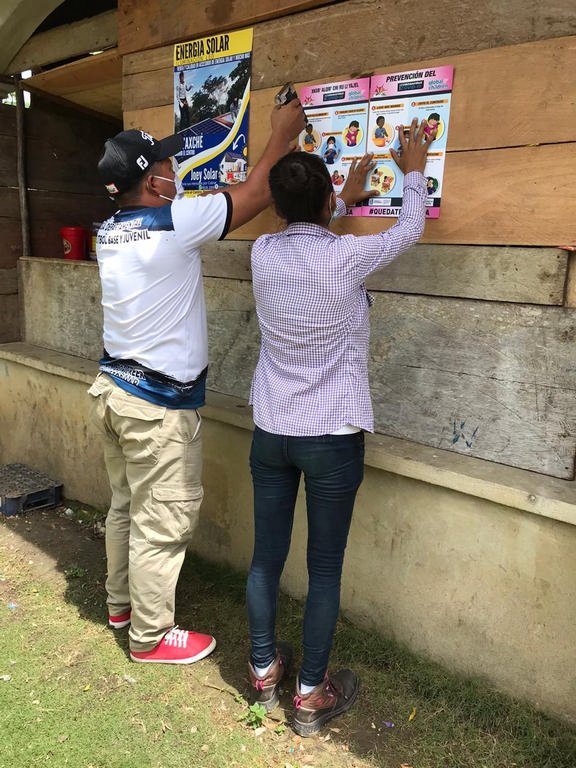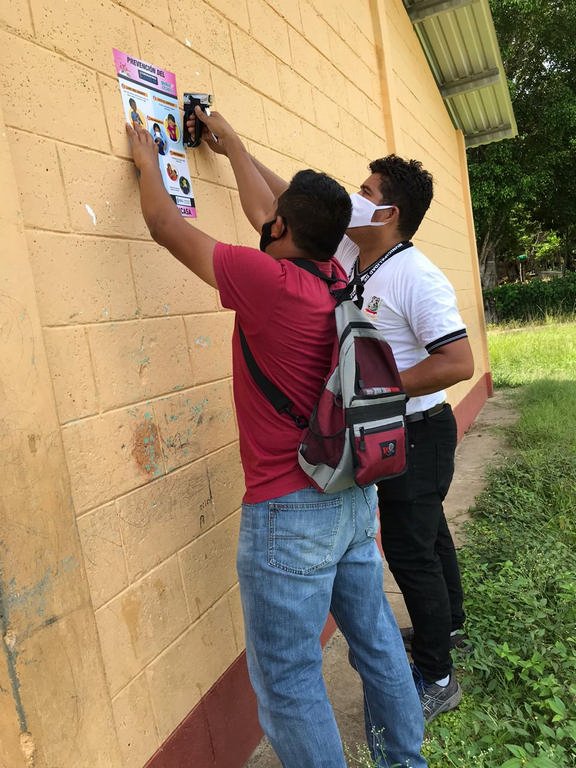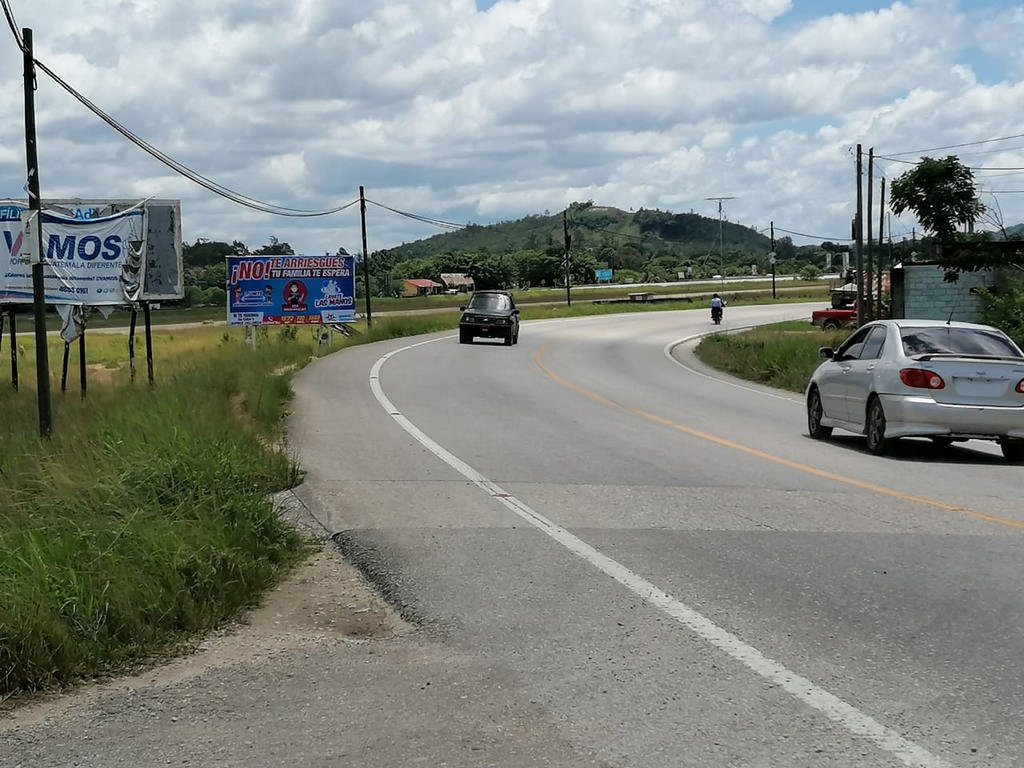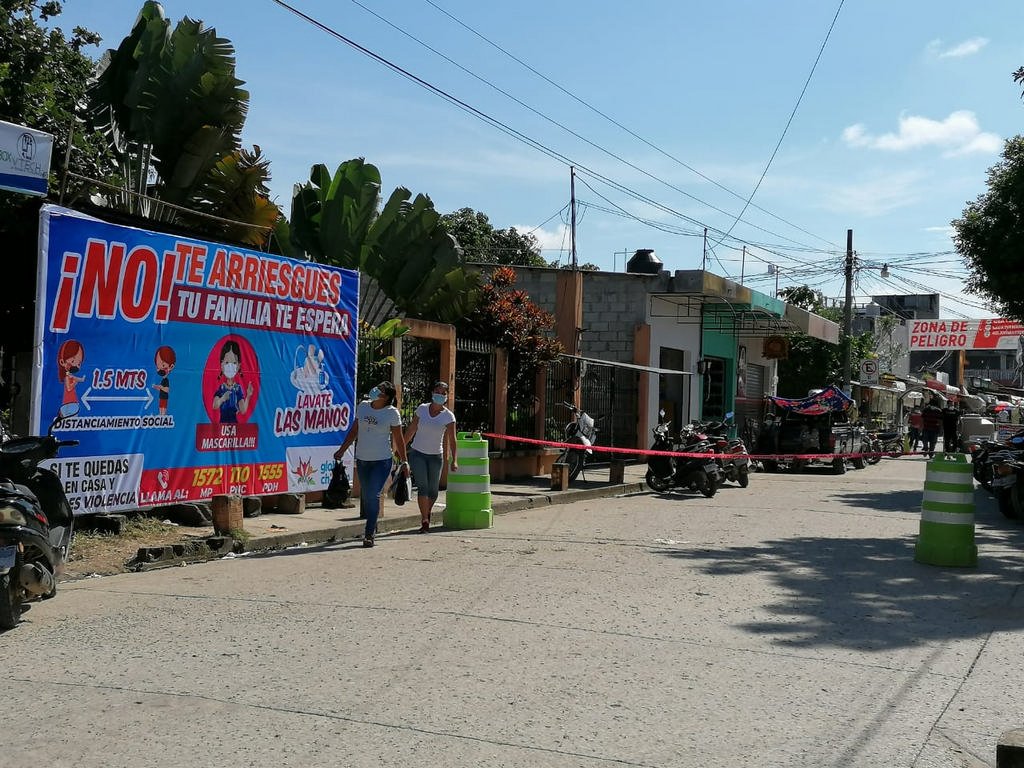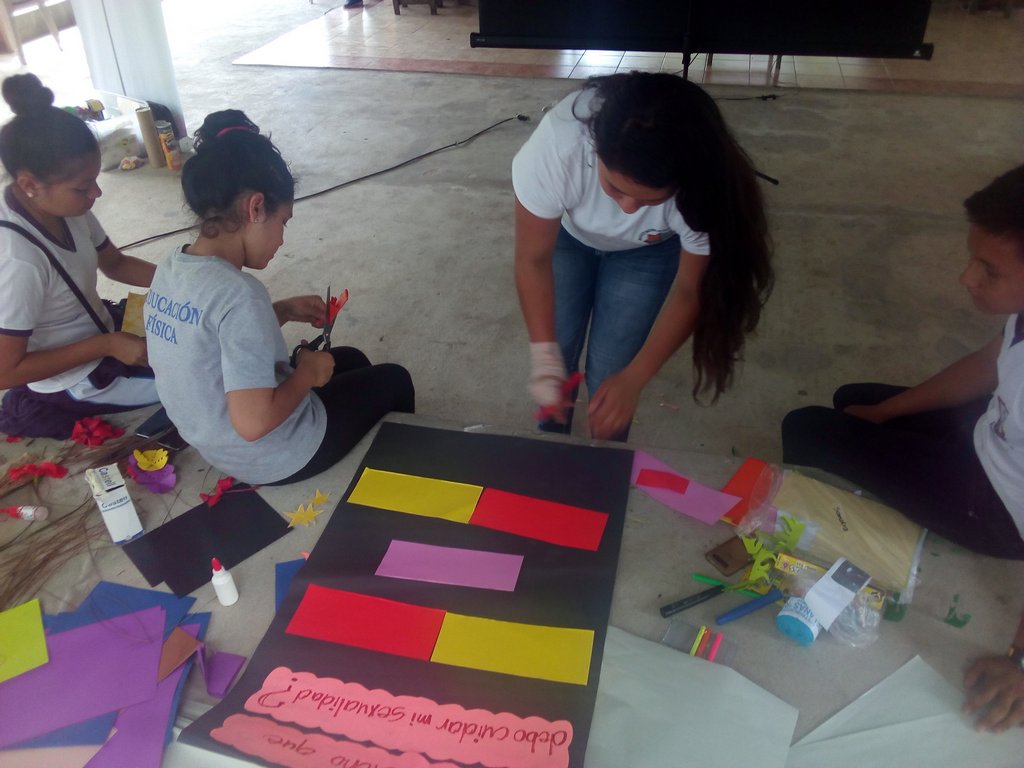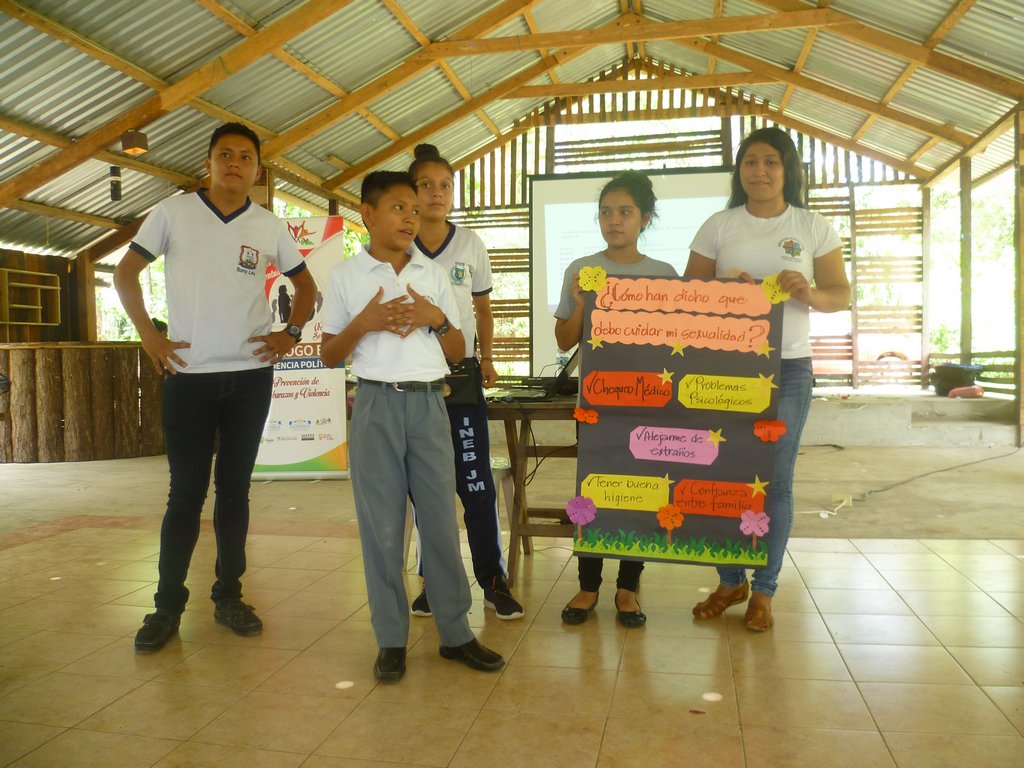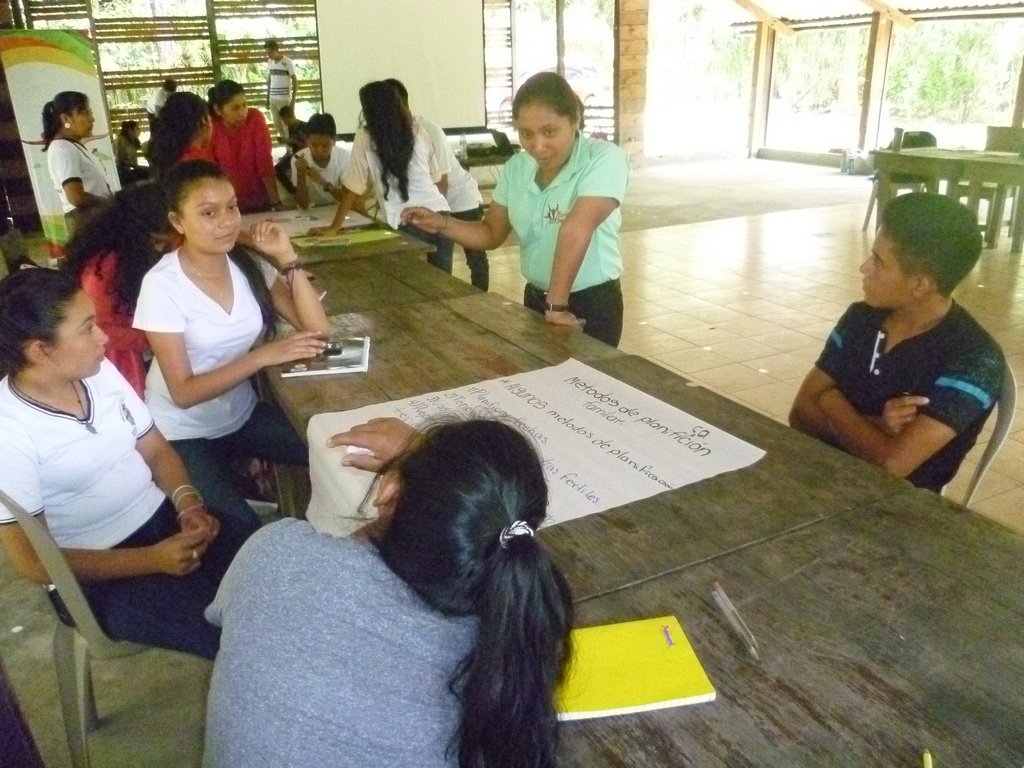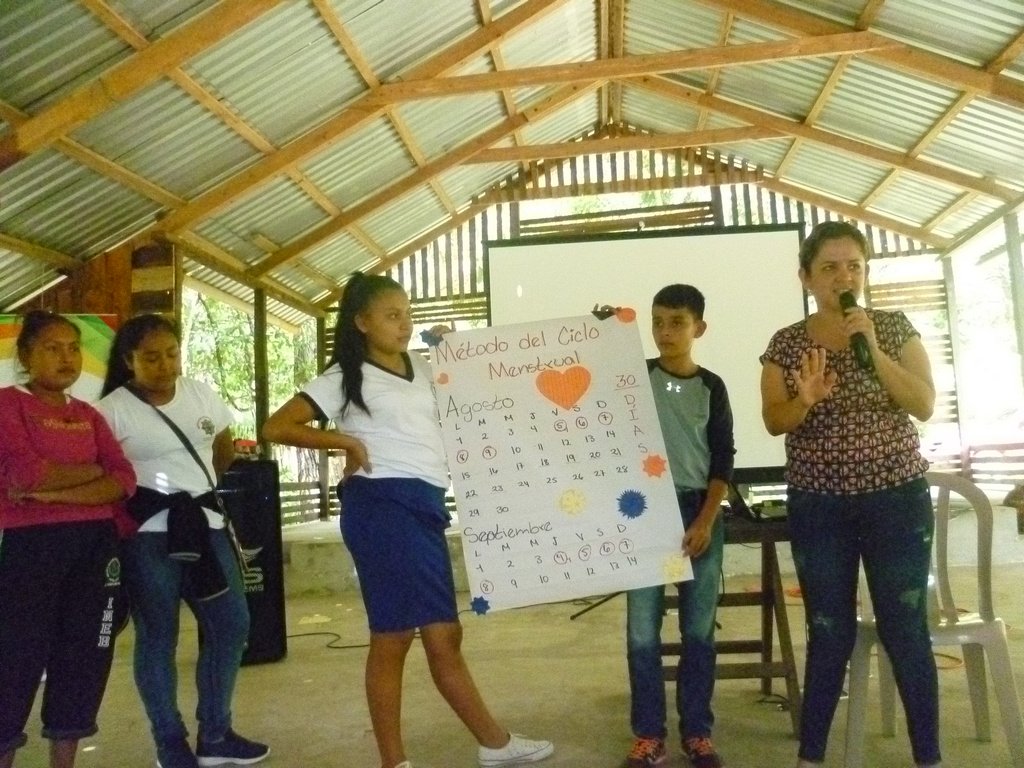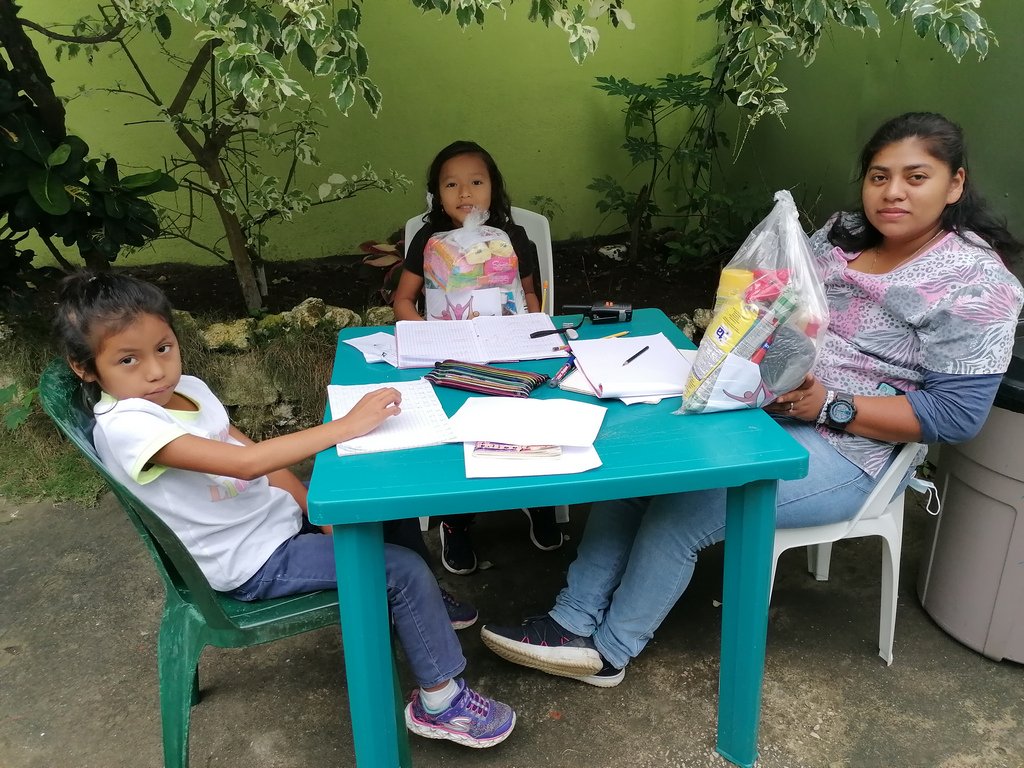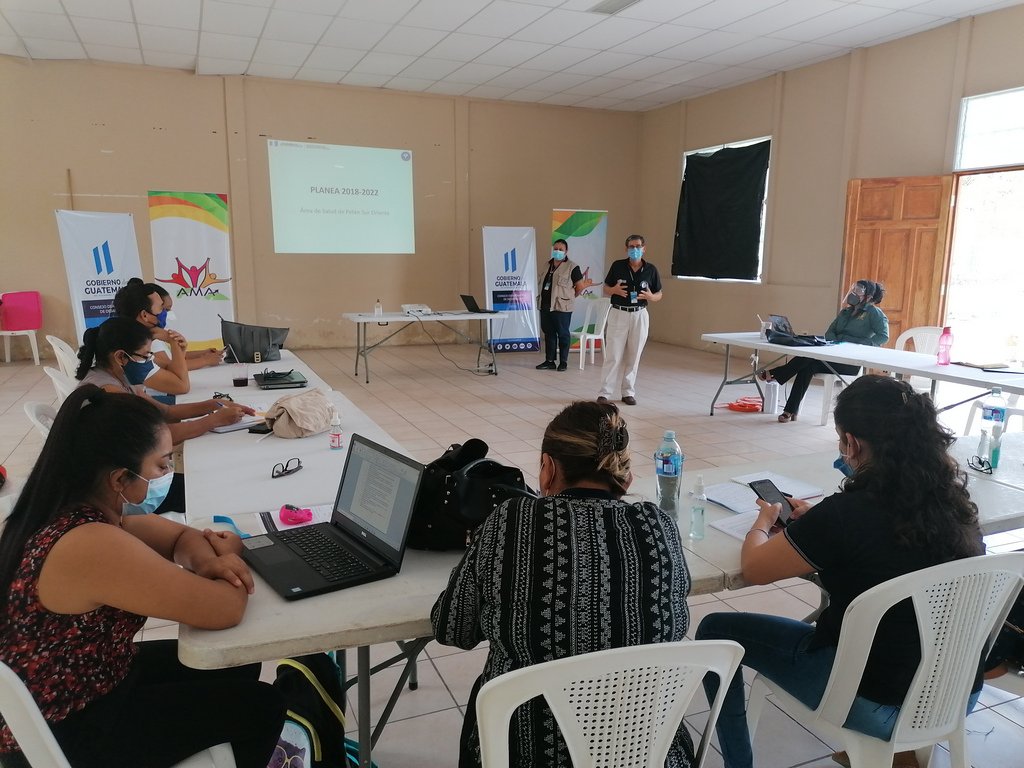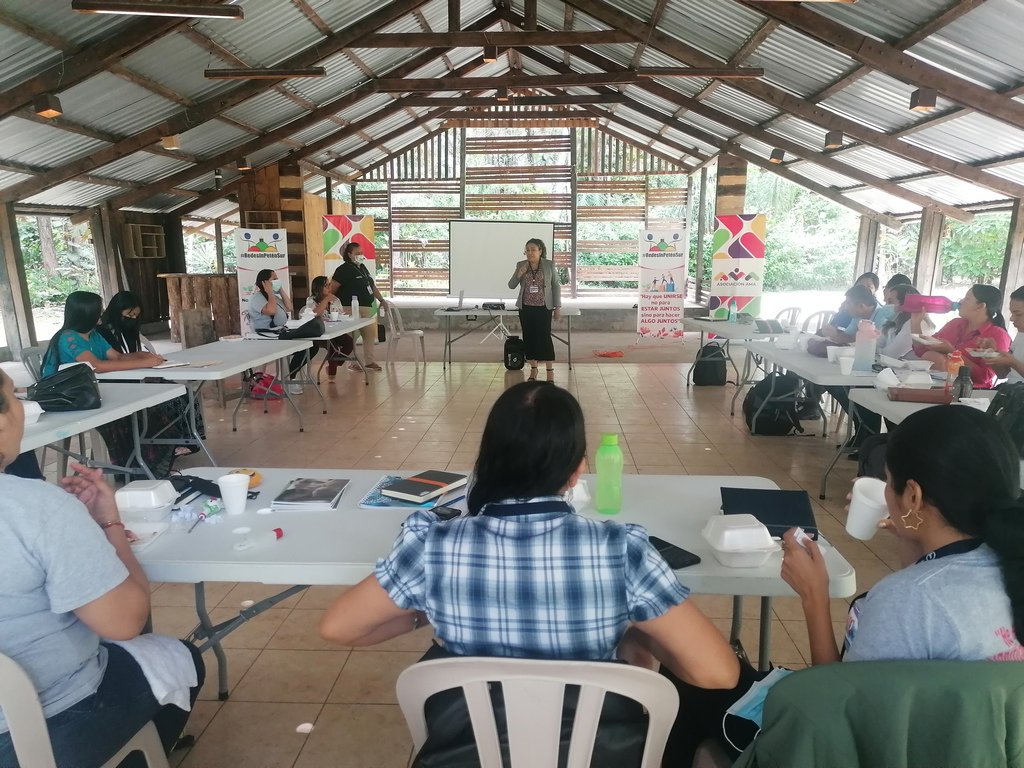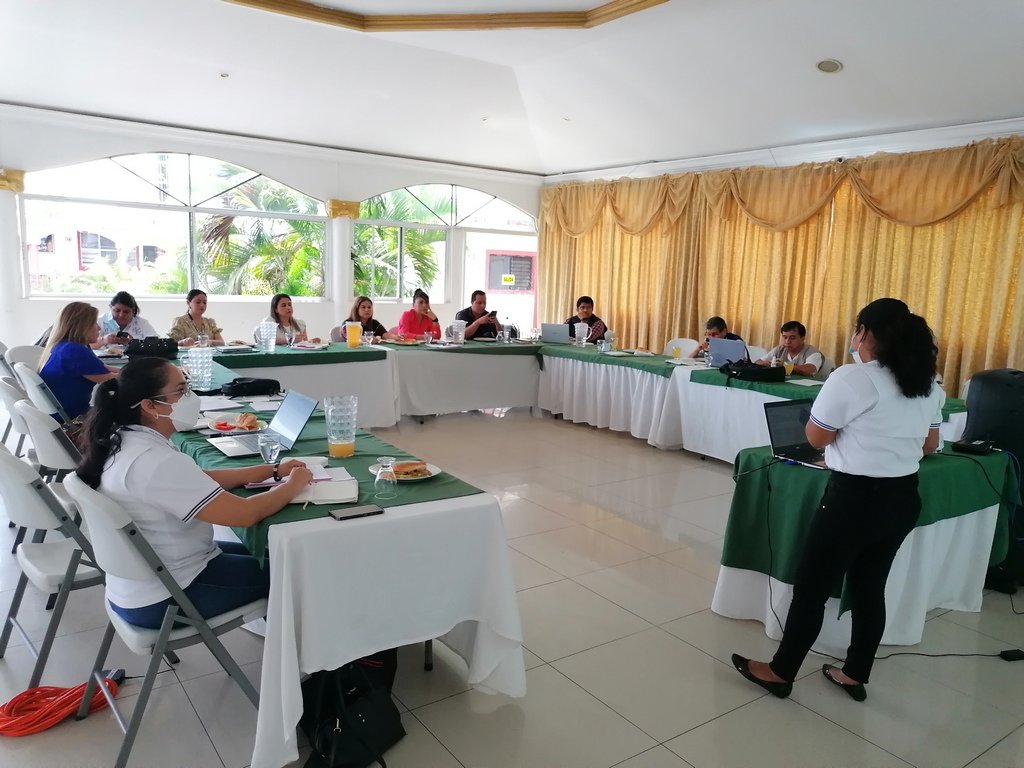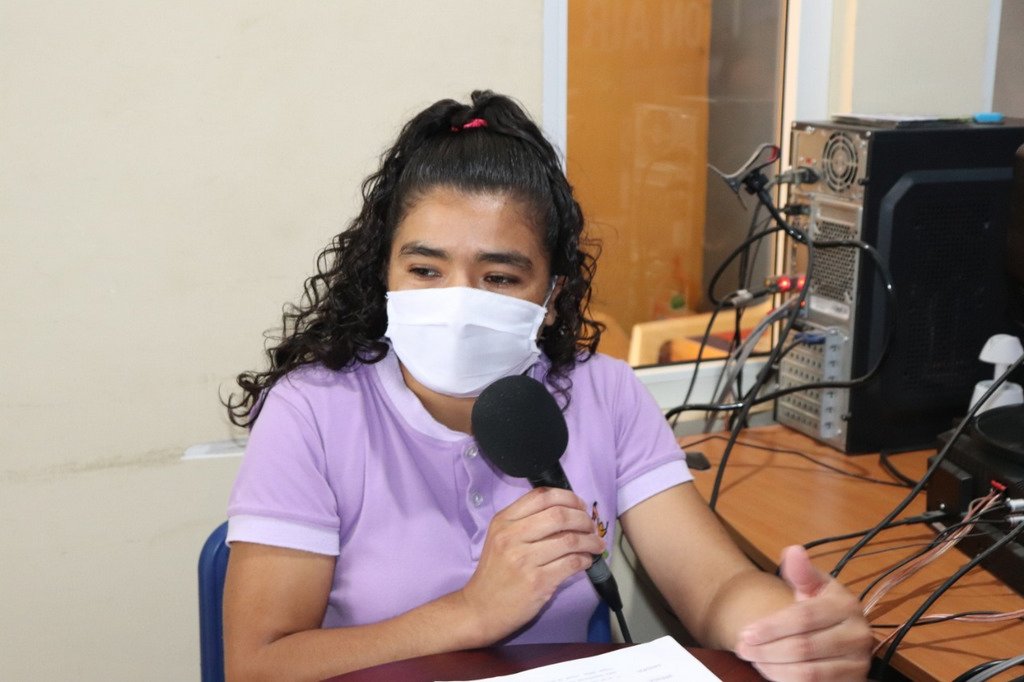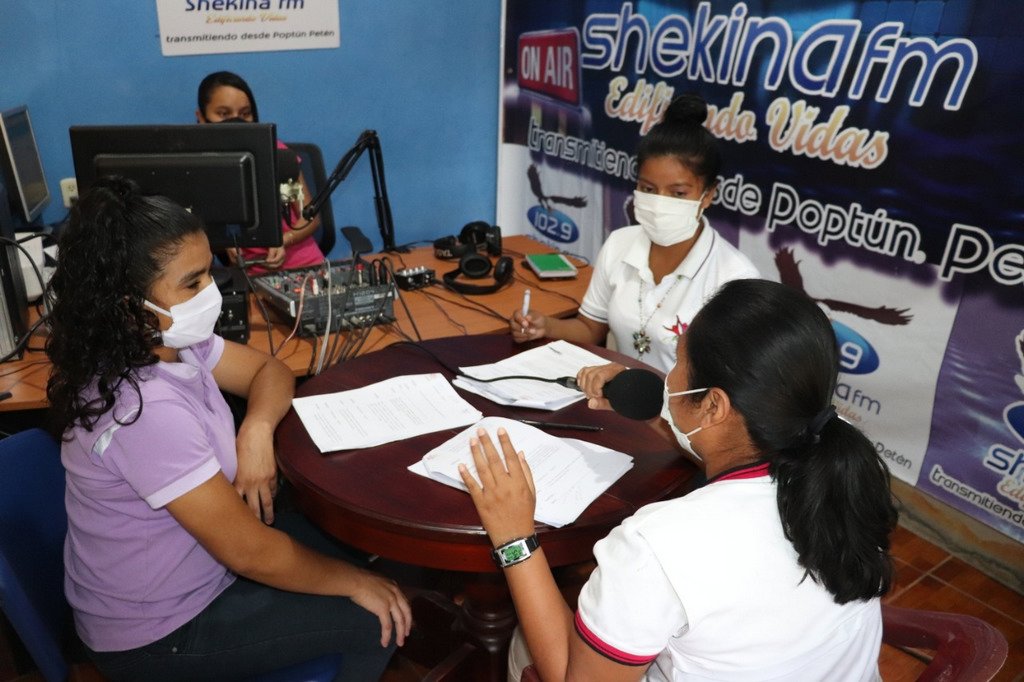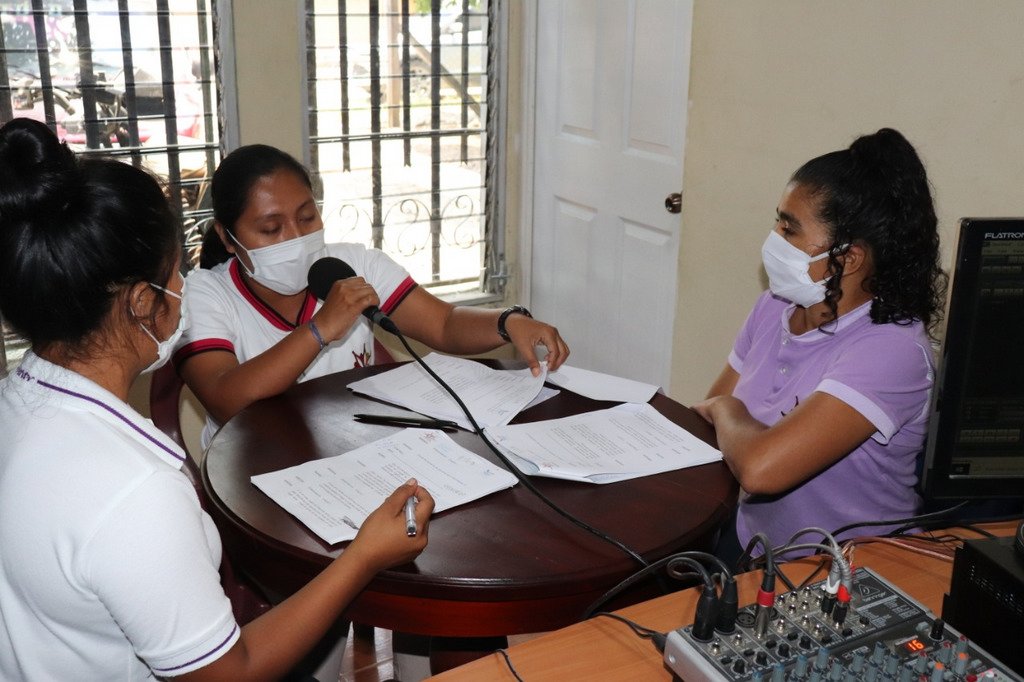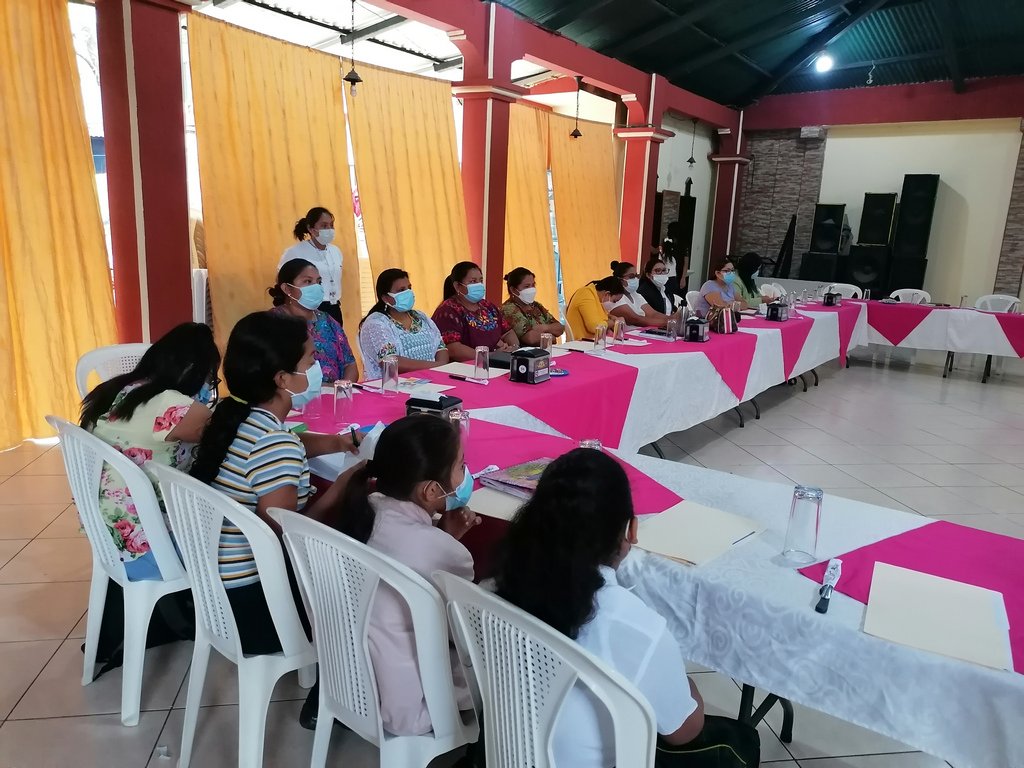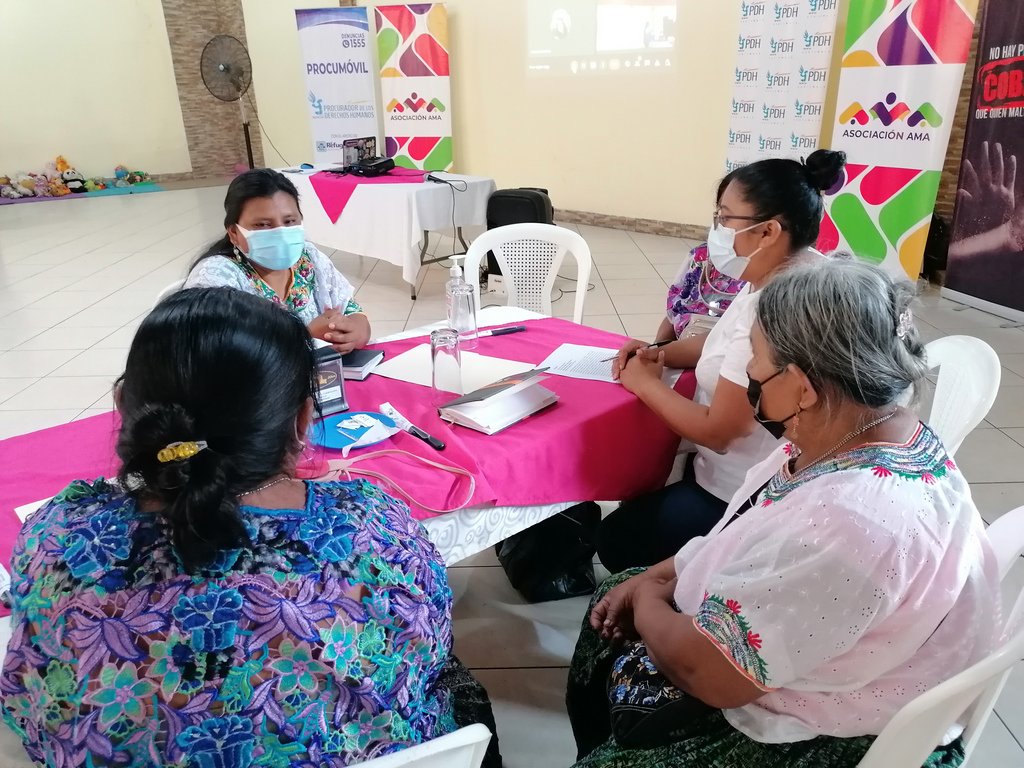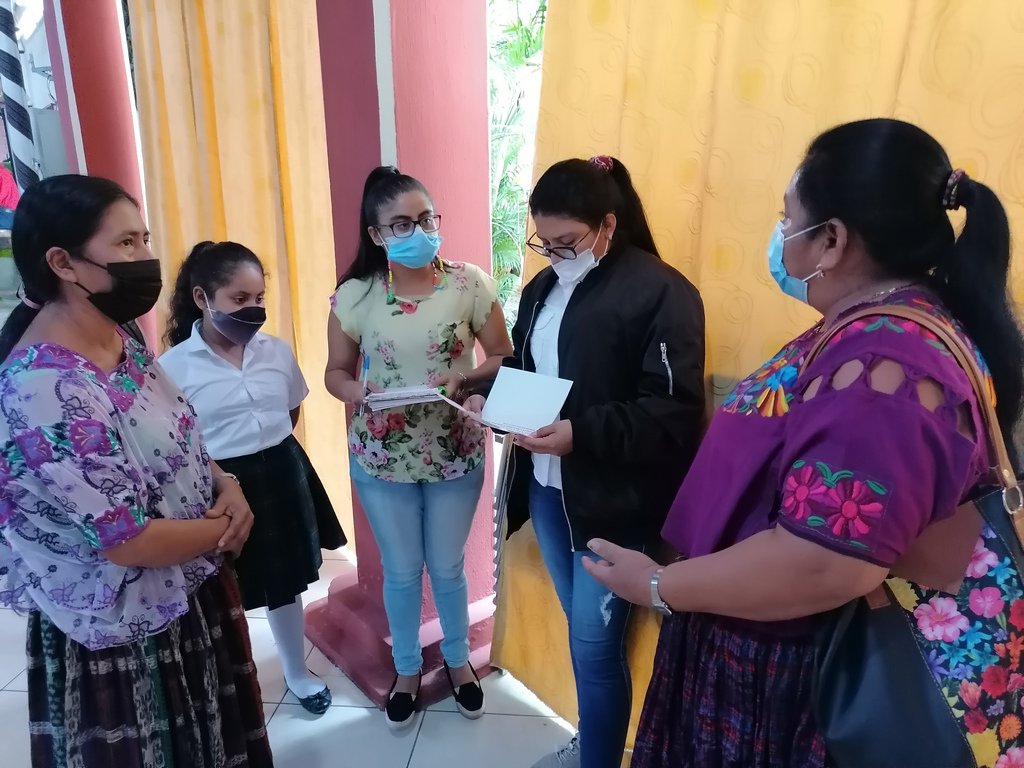
Project Name:
Empowering Adolescent Girls in Central America
Phase I to Phase IV (2019 to 2022)
Fecha de inicio: Enero/2019
End date: Dec/2022
42 young female volunteers
From 2019 to 2022, the AMA Association partnered with the "Empowering Adolescent Girls in Central America" program, an initiative of the Global Child Fund (GFC) in conjunction with the Dubai Cares Foundation. This program aimed to deepen and expand gender equality and promote the rights and opportunities of adolescent girls in Guatemala, Honduras, and Nicaragua. Through this initiative, leaders and grassroots organizations were supported to strengthen their organizations with innovative programs that empower children and youth. For this, GFC combined flexible financing, technical assistance, access to networks, and program staff support.
Within this framework, the AMA Association focused its participation on activities that strengthen internal capabilities, empower adolescent girls, and engage in dialogue and advocacy activities involving adolescent girls and decision-makers from government institutions and civil society organizations. These efforts aimed to prevent early pregnancy and sexual violence in the Petén department, Guatemala.
Program Phase 2019-2022
- Three camps named "Youth Diplomas on the Prevention of Pregnancy and Sexual Violence in Adolescent Girls" were developed, in which 42 adolescents aged between 13 and 15 years old participated. These adolescents were part of the school governments in six basic education institutes from communities and marginal urban areas of the municipalities of San Luis, Poptún, Dolores, El Chal, and Santa Ana, in Southern Petén. The purpose of these camps was to provide adolescents with tools about the importance of preventing pregnancies and sexual violence as part of their life plans, as well as to strengthen the leadership skills of the school government members. The camps lasted a day and a half and were facilitated by collaborators from the Adolescent Component of the Petén Sur Oriente Health Area and the AMA Association. They used the inductive-deductive "learning by doing" methodology with a content multiplication focus. The participants replicated the content learned in the camps with approximately 1200 adolescent students from the institutes of their communities.
- An Organizational Capacity Self-Assessment (OCA) workshop was conducted, facilitated by an expert in capacity development from GFC. The workshop lasted a day and a half and took place in Poptún, Petén, with the participation of 15 members of the AMA Association, including collaborators and volunteers from communities and urban marginal areas of San Luis and Poptún, Petén. This workshop enabled the development of AMA's Organizational Development Plan and revealed that the Association's interventions are largely consensus-driven with volunteers and the executive team, ensuring their successful outcomes. Moreover, it highlighted the importance of having a communication plan to increase the visibility of the Association and its work, as it was determined that many quality activities with results were not widely known.
- With the development of the communication plan, media plan, and restructuring of AMA's website, the organization's institutional capacity area was strengthened. The first element was the Communication Plan, which also included the redesign and update of AMA's website. This activity was developed following the results of the organizational capacity self-assessment, highlighting these aspects as crucial areas to strengthen and serving as a reference for the Organizational Development Plan. The communication and media plan systematically enhanced AMA's visibility to its target population and the international community, creating a platform for external information required by adolescent girls, potential partners, and new donors. Regarding the redesign and update of the AMA Association's website, it was considered necessary to improve the image, contents, accessibility, and interactions for the girls/adolescents and general users. It has also allowed AMA to have a better image among partners and potential donors, as it is one of the main tools, they use to obtain external information about organizations, thus improving the chances of gaining more allies
1. Thirty Broadcasts of the Bilingual Radio Program "The ABC of Sexuality"
- Asociación AMA en respuesta a la emergencia ocasionada por la pandemia del COVID-19 implementó una campaña educativa sobre normas de seguridad e higiene para fortalecer las acciones de contención, prevención y respuestas al COVID-19 en Guatemala.
- Accordingly, a special season of the bilingual Spanish-Maya Q’eqchí radio program "The ABC of Sexuality" was developed to educate, inform, and sensitize adolescent girls and their families about the correct safety measures, hygiene, and the importance of continuing their education during the pandemic.
- La temporada especial se transmitió a través de dos radios comunitarias, Radio U´tan Kaj y Radio Shekina, 15 programas de una hora a la semana cada uno y en cada emisora. Fueron financiados por GFC a través de su fondo de emergencia.
- The broadcasts included spots related to hygiene, safety, and violence prevention, created by the AMA Association and various institutions, such as the University of San Carlos de Guatemala (USAC), the Secretariat against Sexual Violence, Exploitation, and Human Trafficking, UNICEF, MINEDUC, and the National Civil Police (PNC).
2. Instalación de dos vallas publicitarias
- Se colocaron dos vallas publicitarias con información sobre prevención de la violencia en tiempos de pandemia y medidas de seguridad e higiene del COVID-19 en Poptún, Petén, esto debido a que el municipio de Poptún es el centro de convergencia del Sur de Petén.
- The billboards also contained telephone numbers for reporting violence experienced during confinement, addressing the increased rates of domestic and sexual violence in Guatemala during the pandemic, with emergency funds from GFC.
3. Delivery of Supplies and Equipment to the Ministry of Public Health and Social Assistance
- Se entregaron tres Balanzas o Básculas Mecánicas de colgar SYF 55 libras con su respectivo reloj y con dos ganchos para colgar, los cuales fortalecieron el monitoreo de casos de desnutrición en niñas y niños menores de 5 años, en 17 comunidades dentro de la jurisdicción del Puesto de Salud Los Encuentros Poptún, Petén; ya que debido al COVID-19 los casos de desnutrición han aumentado.
4. Distribution of Bilingual Spanish-Maya Q’eqchí’ COVID-19 Prevention Informational Material
- 3,000 bilingual Spanish-Maya Q'eqchi' illustrated posters on COVID-19 prevention and hygiene norms were placed in high-traffic areas such as schools, neighborhood stores, refreshment stands, and tortilla shops.
- The posters were placed in Maya Q’eqchí’ and Mestizo communities and urban marginal areas of the 14 municipalities of Petén by AMA collaborators and through strategic alliances with the Three Health Area Directorates of Petén (South East, North, and South West) and Municipal Offices for Child and Adolescent Protection and Municipal Offices for Women.
- The availability of these posters increased local alliances, as most institutions lacked bilingual printed materials to disseminate information about COVID-19 prevention and hygiene norms, leading them to seek AMA's support.
- In partnership with the Rural Home Unit of the Ministry of Agriculture, Livestock, and Food – MAGA, posters were placed in communities near the adjacency line between Guatemala and Belize. Social Work students from the University of San Carlos of Guatemala - USAC Extension Poptún, as part of their practice, also placed posters in their area of influence, as well as in the offices of the Indigenous Women's Defense - DEMI and the Human Rights Auxiliary Office of Southern Petén.
- Due to the high quality and size of the posters, they also served as educational tools used by allied institutions in their work with groups, strengthening COVID-19 prevention in the department of Petén. The 3,000 posters were acquired with emergency funds provided by GFC.
5. Meeting of the Petén Departmental Technical Table for the National Plan to Prevent Adolescent Pregnancies (PLANEA)
- To reactivate Petén's PLANEA, a meeting was held with participants including the Petén Departmental Director of Education (DIDEDUC), officials from the same, the three Health Area Directors of Petén (South East, North, and South West), officials from these areas, the National Youth Council (CONJUVE), Ministry of Social Development, and AMA Association.
- The meeting reactivated the table and initiated the Strategic Plan for 2021, agreeing that all municipalities in Petén should include actions to address the high rate of pregnancies and not just focus on the municipalities prioritized nationally (San Luis, Poptún, San José, San Benito, Sayaxché) due to increasing pregnancy rates.
- It was also established that it was necessary to present the integration of the table to the Petén Development Council (CODEDE), as required by PLANEA guidelines, and to incorporate municipalities within the institutional framework to address the issue. This responsibility was assigned to the Director of DIDEDUC, the Director of the Petén North Health Area, and AMA, who were to advocate for PLANEA's presentation at the next COCODE meeting.
- PLANEA should have been integrated and active in Petén since 2018, but the Departmental Governor at the time did not provide the space to present it to CODEDE (Governors preside over PLANEA). Therefore, the AMA Association, in alliance with DDEDUC and the Health Area, advocated for its formalization and activation in Petén.
- The activity was carried out with emergency funds provided by GFC to AMA.
6. Presentation of PLANEA to the CODEDE of Petén
- The integration of the PLANEA table was presented to the Petén Development Council (CODEDE), presided over by the Governor of Petén, the Director of Education, and Directors of the Petén Health Areas.
- This intervention was conducted to comply with the guidelines for officially creating the table and to coordinate efforts with Petén's mayors and other institutions to provide a comprehensive and sectoral response to the high rates of adolescent pregnancies and sexual violence.
- It is important to mention that due to the arrival of storms Eta and Iota in Petén, follow-up to the table was hindered, as the Ministry of Health and Ministry of Education, being the main actors, focused their work on responding to these emergencies, in addition to the COVID-19 pandemic, vaccination efforts, and the migration crisis faced by Honduras, as Petén is a migrant route. These combined conditions have prevented the continuation of progress.
7. Distribution of Food and Hygiene Kits to Adolescent Girls with Disabilities
- Bags of food and hygiene kits were delivered to a group of adolescent girls and young women receiving therapy at the LUFECADIS civil association, who have various disabilities, and from Casa Hogar AHICAM, who are victims and survivors of violence.
- La crisis alimentaria provocada por el Covid-10 afectó a todos y en esta ocasión Asociación AMA tuvo la oportunidad de apoyar a este grupo de población que es vulnerable, no solo por el nivel de pobreza si no por los desafíos que estas enfrentan debido a los tipos de discapacidad que sufren y las situaciones de violencia que han vivido.
- This support was possible thanks to an emergency fund provided by the Global Child Fund.
- The food bags contained items such as sugar, rice, oil, corn flour, beans, among others.
- The hygiene kits included sanitary pads, bath soap, bleach, liquid soap, antibacterial gel, toilet paper, and disposable diapers for the girls who needed them, to ensure health, menstrual hygiene, and COVID-19 prevention.
1. Six Workshops on the Use of Digital Platforms and Social Media for Online Facilitation
- Six workshops were conducted to strengthen the capacities of collaborators from the "Vida Digna" organization in using digital platforms and social media for online facilitation. The workshops focused on:
- Creation and management of material for online facilitation;
- Use of virtual platforms for online facilitation and social media;
- Basic tips for facilitating online;
- How to effectively facilitate online workshops;
- How to facilitate online team meetings;
- How to design dynamic online spaces.
- The workshops were held from March 12 to April 23, 2021, once a week, each lasting two hours, developed under the Training 4 Change methodology, and facilitated by two bilingual (Spanish-Maya Q’eqchí) adolescent girls and young women project technicians from the AMA Association, who were trained by the Training 4 Change organization with the support of GFC.
- This activity enabled adolescent girls and young women project technicians from the AMA Association to strengthen their skills in facilitating workshops on the use of digital platforms and social media for online facilitation.
- It also allowed the AMA Association to have a new alternative for fundraising through providing training services to collaborators from organizations, companies, or public officials in the use of digital platforms and social media for online facilitation, as a fee will be charged for this service. GFC provided funds to AMA to conduct this activity.
2. Acquisition of a Vehicle
- During the reporting period, the AMA Association acquired a 4x4 Pick-Up vehicle. With part of the funds granted by GFC from the primary subsidy, the partial costs of the vehicle were covered, which was necessary for AMA to carry out field activities.
- Due to the pandemic, the AMA Association changed much of its work methodologies and transfer of capabilities to adolescent girls and young women. Before the pandemic, AMA conducted its activities in the municipality of Poptún, where participants would travel from their communities to the urban case of the municipality. With the arrival of the pandemic in Guatemala, this methodology was changed, as it is now necessary for the AMA team and supplies to be transported to the participants' communities of origin, to avoid exposing them to COVID-19 infections.
- In this regard, the acquisition of the vehicle has been of great importance and has strengthened AMA's response during the pandemic. It is worth mentioning that the communities where AMA focuses its work are distant and difficult to access, making it necessary to have the vehicle, especially one with double traction, to enter communities where roads are in poor condition.
- The vehicle was acquired thanks to the support of the program and the contribution of the organizations: Women Win and Global Fund for Women, of which the AMA Association is a co-partner.
3. Translation of AMA's Website
- During the reporting period, AMA's website was translated into English. AMA hired a consultant to carry out the work. The consultant translated the following components: English website. Homepage/Slider/Menu/Others. About AMA (7 pages). What We Do? (7 pages). Our Cause (6 pages). Press Room. Cloning Website (www.asociacionama.org/en). The translation included the requirements specified by the donor
- The translation of AMA's website into English aimed to increase the visibility of the AMA Association towards international cooperation. This allows more international partners to have information about AMA in English, with the expectation of expanding the international cooperation portfolio.
1. Updating AMA's Strategic Plan
The AMA Association carried out the update of its strategic plan, which was done with organizational development funds granted by GFC. This was necessary because, like any organization, AMA needs to have an updated tool to guide its work, based on the guidelines of its statutes and the vision originally established by the youth group.
Accordingly, the AMA Association hired a consultant to develop a strategic tool that systematically organizes the ideas and actions of the AMA Association to improve and guide the management of the organization.
Therefore, the consultant prepared AMA's strategic plan in a participatory manner, working closely with AMA's Executive, Administrative, and the adolescent girls and young women who make up the technical team.
2. Meeting of the "Prevent with Education" Petén Departmental Technical Table
With advocacy funds granted by GFC, a meeting of the "Prevent with Education" Petén Departmental Technical Table was held, aiming to strengthen the joint efforts between the Ministry of Education, the Ministry of Public Health and Social Assistance, and AMA, to start establishing the 2022 Strategic Plan of the "Prevent with Education" Petén Departmental Technical Table and to fulfill the "Prevent with Education" 2022-2025 Agreement.
Due to the COVID-19 pandemic, the coordination of efforts among the aforementioned actors had been affected, making it necessary to resume the actions of the table.
During the meeting, both the Ministry of Health and the Ministry of Education presented their progress in contributing to the reduction of pregnancies in adolescent girls and also expressed that due to the health restrictions caused by the pandemic, it is more difficult to work with adolescent girls.
DIDEDUC representatives announced that in 2022, 26 diplomas on comprehensive sexuality education and violence prevention will be conducted in the 26 education districts of the 14 municipalities of Petén.
Approximately 650 primary and basic level teachers will participate, benefiting around 13,000 girls, boys, adolescents, and youth who will receive sexual education in their classrooms. The teachers participating in the diplomas are required to put into practice the learned content.
The AMA Association has monitored the launch of the diplomas in Southern Petén, ensuring that they have started in the municipalities of San Luis, Poptún, Dolores, El Chal, and Santa Ana, Petén. AMA is also collaborating in the facilitation of topics related to sexual education and violence prevention.
It is worth mentioning that in the municipality of Dolores, Petén, the diploma is being conducted remotely. In 2020, AMA strengthened the capacities of 25 DIDEDUC pedagogical advisors through a diploma on the use of digital platforms for dynamic distance education implementation.
The meeting also established the schedule for the circles, camps, and workshops that AMA is conducting with the participation of adolescent girls, midwives, and health district staff in Southern Petén, thereby strengthening access to comprehensive and differentiated health care for adolescent girls in Southern Petén.
It is of utmost importance to mention that the meeting was attended by the Petén Departmental Director of Education and the Director of the Petén Sur Oriente Health Area and their respective work teams, allowing direct advocacy with high-level decision-makers in Petén. This has ensured that the commitments made are being put into practice.
3. Reactivation Meetings of the Municipal Tables of Poptún and San Luis, Petén, for the National Plan for the Prevention of Adolescent Pregnancies (PLANEA)
Con fondos de incidencia durante el periodo del informe se realizó una de dos reuniones programadas para la reactivación de las mesas municipales de Poptún y San Luis, Petén, para el plan nacional de prevención de embarazos en adolescentes.
La reunión fue convocada por AMA a través de las redes integradas del Sur de Petén, ya que consideramos un espacio propicio para poder realizar la incidencia para que las mesas municipales para el PLANEA se reactivaran. En tal sentido se logró realizar la incidencia para que las mesas municipales de San Luis y Poptún se reactivarán, esto debido a que la pandemia detuvo su avance.
The AMA Association, along with the Ministry of Health, led the meeting. In the case of the AMA Association, it was represented by Maya Q’eqchí and mestizo adolescent girls and young women, who gave presentations on the importance of reactivating the tables for PLANEA, as well as sharing the work on the prevention of pregnancies and sexual violence against adolescent girls that AMA carries out in alliance with local institutions and international support.
Representatives from the health and education districts of San Luis, Poptún, Dolores, El Chal, and Santa Ana, Petén, as well as representatives from the Ministry of Development, the Indigenous Women's Defense, the Human Rights Procurator's Office, Municipal Offices for Child and Adolescent Protection, the Public Ministry, the Sexual Violence Clinic of the Poptún Hospital, UNHCR, and Refugio de la Niñez, and the AMA Association participated in the meeting.
This space allowed for the joint sectoral efforts for the prevention of pregnancies and violence against adolescent girls. It was agreed that the Poptún municipal table would be reactivated on Friday, May 6, representing a significant achievement. The Ministry of Health had not assumed the leadership role it corresponds to in relation to PLANEA to date.
It is noteworthy that the table for PLANEA involves the participation of political actors, as it must be convened through the Departmental Governor for the departmental table and through the mayors for the municipal tables, which complicates their integration.
4. Two Meetings of the Petén Departmental Technical Table for the National Plan for the Prevention of Adolescent Pregnancies (PLANEA)
Durante las reuniones se pudo conocer los avances al plan y determinar que para dar una mejor respuesta al alto índice de embarazo y violencia sexual contra niñas adolescentes es necesario continuar fortaleciendo su acceso a la educación integral en sexualidad (EIS) y la prevención de la violencia (PV), en tal sentido inclinar esfuerzos en concluir a distancia los diplomados sobre EIS y PV que se están realizando en los distintos Distritos Escolares de Petén.
It should be noted that at that time, diplomas on EIS and PV were being conducted in the 14 municipalities of Petén, which represents a significant achievement, as these had been suspended due to the arrival of COVID-19, and they are now being concluded in some municipalities such as Poptún, El Chal, San José, Sayaxché, and San Francisco, Petén.
It was also determined that it is important to continue strengthening friendly spaces for adolescents and implement a remote methodology strategy to reach them and send information on sexual and reproductive health, responsible sexuality, and violence prevention. Currently, social workers from health districts are communicating with adolescents, especially through WhatsApp groups, where they send articles, videos, and conduct discussions on these topics.
5. Presentation to Adolescent Girls and Youth and Community Leaders in Southern Petén of the "Silenced Lives" Study by FLACSO Guatemala
AMA, in partnership with the Human Rights Procurator's Office of Poptún, presented the "Silenced Lives" study, research on suicide in pregnant adolescents by FLACSO Guatemala.
"Silenced Lives" is a study conducted by FLACSO Guatemala, which addresses the suicide of pregnant adolescents, many of whom have been victims of sexual violence, leading them to take their own lives.
The presentation of the "Silenced Lives" study included the participation of adolescent girls, local leaders, civil society organizations, and coordinators of the municipal offices for child, adolescent, and youth protection in Southern Petén. The study is research on suicides in pregnant adolescents conducted by FLACSO Guatemala and was presented in Southern Petén in partnership with the PDH of Poptún and the financial support of the Global Fund for Children.
For AMA, it was very important to have the presence of girls participating in our programs, as by being present in this activity, they are informed, learn about what many adolescents have experienced, and can share what they are learning with other girls from their establishments and communities to prevent further suicides of pregnant girls and adolescents due to violence.
Sexual violence and pregnancies among adolescent girls and young women are increasing problems in Guatemala, and the communities of Southern Petén are no exception (Municipalities of San Luis, Poptún, Dolores, El Chal, and Santa Ana).
As a result, the National Observatory of Sexual and Reproductive Health – OSAR – reports that from January to October 2019, there were 114,858 pregnancies among indigenous and mestizo girls and adolescents aged 10 to 19 years, of which 5,061 correspond to girls between 10 to 14 years, an age where they are typified as Victims of Sexual Violence.
For the same period in Petén, OSAR reports 3,685 pregnancies among girls and adolescents aged 10 to 19 years, of which 177 correspond to sexual violence crimes as they are girls aged 10 to 14 years.
In Southern Petén, there are 1,070 pregnancies among girls and adolescents aged 10 to 19 years, of which OSAR reports that 41 correspond to girls aged 10 to 14 years.
Activities 2020-2021
- Youth Diplomas on the Prevention of Pregnancy and Sexual Violence in Adolescent Girls
42 adolescent girls aged between 13 and 15 years, who were part of the school governments in 6 basic education institutes in communities and marginal urban areas of the municipalities of San Luis, Poptún, Dolores, El Chal, and Santa Ana, in Southern Petén.
- Bilingual Spanish-Maya Q’eqchí Radio Program "The ABC of Sexuality"
3,000 adolescent girls and young women from communities and marginal urban areas in Southern Petén, listeners and connected to the program via radio and Facebook Live.
- Delivery of three SYF 55-pound Hanging Mechanical Scales with Clock and Hooks
85 children under 5 years of age from 17 communities within the jurisdiction of the Los Encuentros Health Post in Poptún, Petén.
- Distribution of Bilingual Spanish-Maya Q’eqchí Informational Material on COVID-19 Prevention
15,000 adolescent girls and young women from the 14 municipalities of the Petén department, who were informed through 3,000 bilingual Spanish-Maya Q'eqchi' illustrated posters on COVID-19 prevention and hygiene norms.
- Six Workshops on the Use of Digital Platforms and Social Media for Online Facilitation
Six collaborators from the “Vida Digna” organization.
- Meetings of the Petén Departmental Technical Table for the National Plan for the Prevention of Adolescent Pregnancies (PLANEA)
22,000 adolescent girls and young women benefited from the actions carried out within the framework of PLANEA in the Petén department.
- Youth Diplomas on the Prevention of Pregnancy and Sexual Violence in Adolescent Girls
1,200 adolescent students from the 6 basic education institutes in communities and marginal urban areas of the municipalities of San Luis, Poptún, Dolores, El Chal, and Santa Ana, in Southern Petén, who benefited from the replicas carried out by the 42 participants in the interactive training camps.
- Bilingual Spanish-Maya Q’eqchí Radio Program "The ABC of Sexuality"
6,000 people from communities and marginal urban areas in Southern Petén, where the radio station is tuned.
- Delivery of 3 SYF 55-pound Hanging Mechanical Scales with Clock and Hooks
850 families from the 17 communities within the jurisdiction of the Los Encuentros Health Post in Poptún, Petén, benefited from the donated equipment.
- Distribution of Bilingual Spanish-Maya Q’eqchí Informational Material on COVID-19 Prevention
60,000 adolescent girls and young women from the 14 municipalities of the Petén department, who receive indirect information through 3,000 bilingual Spanish-Maya Q'eqchi' illustrated posters on COVID-19 prevention and hygiene norms.
- Meetings of the Petén Departmental Technical Table for the National Plan for the Prevention of Adolescent Pregnancies (PLANEA)
5,500 families of adolescent girls and young women benefited from the actions carried out within the framework of PLANEA in the Petén department.
Volunteering:
42 adolescent girls aged between 13 and 15 years, who were part of the school governments in 6 basic education institutes, strengthened their leadership skills and are empowered to prevent early pregnancies and sexual violence.
- 1,200 adolescent girls aged between 13 and 15 years, who were part of the school governments in 6 basic education institutes in communities and marginal urban areas of the municipalities of San Luis, Poptún, Dolores, El Chal, and Santa Ana, in Southern Petén, have strengthened their leadership skills, teamwork, prevention of early pregnancies, and sexual violence.
- 3,000 adolescent girls and young Maya Q’eqchí and Mestizo women are sensitized about ways to prevent violence during the pandemic, biosecurity norms for COVID-19, the importance of continuing in school, and their sexual and reproductive rights.
- The technical table for the national plan for the prevention of adolescent pregnancies (PLANEA) in the Petén department has been reactivated.
- The 2020 strategic plan for the "Prevent with Education" Petén Departmental Technical Table has been established.
- Food security and nutrition during the pandemic for adolescent girls at the AHICAM home have been strengthened.
- Prevention of COVID-19 in the 14 municipalities of the Petén department has been strengthened through the broadcasting of radio programs, Facebook live, posters, and educational billboards with cultural relevance.
With the support of Dubai Cares, part of the Mohammed bin Rashid Al Maktoum Global Initiatives, the Global Fund for Children's Empowering Adolescent Girls project worked with a network of 17 community organizations to promote gender equality and the rights and opportunities of girls in Central America.
During the first semester of the program's inception, the COVID-19 pandemic began, and in Guatemala, it entered on March 13, 2020, which was confirmed by the President of the Republic, Alejandro Giammattei, who confirmed the first case, so the program was developed within the framework of this pandemic.
Blog published by Global Fund for Children within the framework of the Empowering Adolescent Girls in Central America program
1. With or without a pandemic, the fight for girls' rights persists in Guatemala
- Without the advocacy work of the grassroots organization AMA Association, thousands of young people in Guatemala would not have access to comprehensive sexual education. Today, in the face of COVID-19, AMA remains determined to ensure that girls have vital information to protect their health, rights, and future.
- Read the full blog here: https://globalfundforchildren.org/story/con-o-sin-pandemia-la-lucha-por-los-derechos-de-las-ninas-persiste-en-guatemala/
2. Stories in Power
- When young people tell their own stories, they can change their lives and transform the world.
- Read the full blog here: https://globalfundforchildren.org/story/historias-en-potencia/
The donor who funded this project





